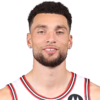
It seems to be a matter of when, not if, Chicago Bulls guard Zach LaVine finds a new home, as the team has sputtered to a 6-14 start. The 6-foot-5 bucket-getter has long been a subject of trade rumors, but they've heated up in recent weeks as Bulls head decision-maker Arturas Karnisovas reportedly views dealing LaVine as the organization's top priority moving forward.
LaVine's reported desired destinations are the Los Angeles Lakers, Miami Heat and Philadelphia 76ers, though it appears that finding a deal with those teams -- or any other team -- may be a difficult task. Suitors are not jumping at the opportunity to acquire LaVine, according to ESPN's Adrian Wojnarowksi, who outlined two main reasons why Chicago has found trouble working out a deal.
"There is not a market for Zach LaVine right now in the NBA," Wojnarowski said. "That's not because Chicago has not tried to find it, and aren't currently trying to find it. It's a combination of a few reasons: LaVine's contract -- four more years at around a $45-46 million a year average. But his productivity, I think this is a player right now who, certainly he's out right now with a foot injury. He's been in and out of the lineup.
"I think the question for teams is, 'How much does Zach LaVine impact winning?' Especially at the salary and with a new salary cap, where you're asking yourself, 'Are we trading for him to be our best player?' No. 'Our second-best player?' No. So, if he's our third best player, do we want to pay that kind of money?"
"There is not a market for Zach LaVine right now."@wojespn with the latest on LaVine and the Bulls 👀 pic.twitter.com/r4stqcKkor
— NBA on ESPN (@ESPNNBA) December 1, 2023
LaVine, who will miss at least a week with a foot injury, is averaging 21 points per game this season, his lowest since 2017-18 with the Minnesota Timberwolves. He's also shooting a career-worst 34% from 3-point range, while his 44% from the field is also the lowest mark since his rookie season. Those are certainly not the numbers expected for a player who signed a five-year, $215 million contract prior to the 2022-23 season.
Wojnarowski outlined the issue perfectly, as a similar problem arose when Bradley Beal sat on the trade market seemingly for years. LaVine is paid like the best player on a championship team, but he clearly isn't viewed that way around the league. And if he's going to be a secondary -- or tertiary -- player on a team that already has other high-paid stars, his salary is going to create all sorts of problems with respect to the new CBA.
The bottom line is, players of LaVine's caliber almost always end up finding a suitor, but -- as was the case with Beal -- sometimes the deal takes longer to develop and the return isn't what the selling team necessarily expected.




















